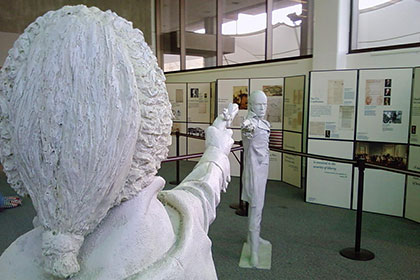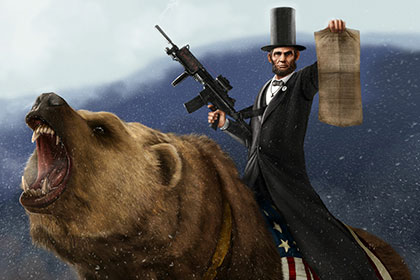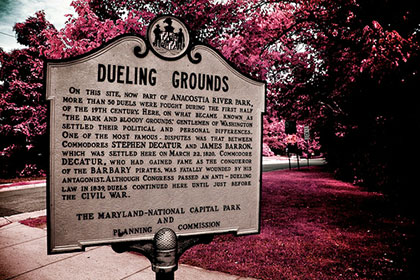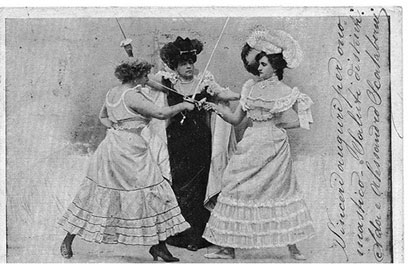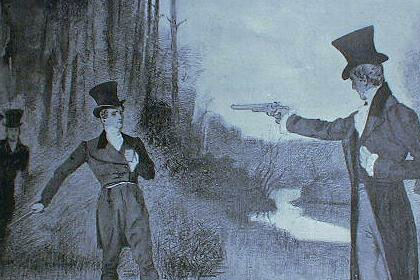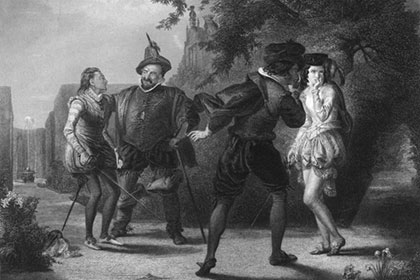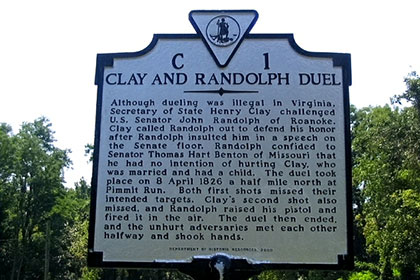In the modern world, we’re taught to apologize when we hurt someone’s feelings and be the bigger person when we are wronged. It’s really no fun at all. Remember the good old days when you could challenge someone to a duel with guns or swords over the smallest insult? “Are you insinuating that I’m fat? Duel!” You never knew when you entered a duel whether either of you would end up dead, which is what made it so exciting. These seven famous duels will get your blood pumping and, even though they sound pretty cool, maybe make you glad we don’t exchange gunfire anymore over Yo Mama jokes and stupid arguments.
-
Alexander Hamilton vs. Aaron Burr:
Politics in the U.S. used to get a lot dirtier than a few mud-slinging campaign ads. Alexander Hamilton and Aaron Burr had long been political rivals back in the days of early America. They’d had run-ins in the past, with Burr beating a Hamilton supporter for a Senate seat and Hamilton making sure Burr didn’t win the presidency. But in 1804, the two had had enough. Burr was running as an independent (rather than a Republican) in the New York governor’s race, and Hamilton kept him from taking needed Federalist votes. Burr lost the election and, after some insults were published, challenged Hamilton to a duel. Hamilton was shot and died the next day.
-
Abraham Lincoln vs. James Shields:
A petty duel seems like it’d be beneath good old Honest Abe, but in 1842, backing down from a challenge just wasn’t an option. Lincoln and James Shields had been in the Illinois state legislature together and gotten along fairly well despite being from opposing parties. But when Shields became State Auditor and started making controversial decisions, Lincoln reacted by writing letters to the editor of the newspaper full of satire and mean words. Shields challenged Lincoln to a duel in 1842, and the rest is history … that you probably never learned in history class. Since Lincoln had been challenged by Shields, he got to decide the terms of the duel and arranged a totally ridiculous scenario that would allow him to disarm Shields without killing him. They were to use broadswords on an island in a pit where they couldn’t cross onto the opponents side. Shields realized just how bad of a situation this was for him, with Lincoln being much taller with longer limbs, and the two settled things peacefully instead just before the fight was supposed to occur. Lincoln agreed to write an apologetic letter to Shields and all was forgiven.
-
Stephen Decatur vs. James Barron:
Stephen Decatur was an American naval hero, famous for protecting U.S. waters from pirates in the early 1800s. He fought alongside James Barron, who was later court martialed (by a board Decatur was a part of) and suspended from the navy for allowing his ship to be taken over by the British. Barron hung out overseas to wait out his expulsion, but even though it ended during the War of 1812, he didn’t try to return to his post until after the war. Decatur, in the meantime, had become a war hero again, and criticized Barron for his selfishness. Barron answered the criticism with a challenge to a duel, and the two ended up shooting each other. Barron was able to live with his wound, but Decatur died the following day.
-
Lady Almeria Braddock vs. Mrs. Elphinstone:
Duels are almost exclusively the game of prideful men, but this duel, known as The Petticoat Duel, was an exception. And boy, was it a pointless one. Back in 1792, Mrs. Elphinstone visited Lady Almeria Braddock at her home and insinuated that she was much older than she claimed to be. Those 18th century ladies don’t mess around, so they arranged a duel. They first used guns at 10 paces, but both of them missed so they moved on to swords. Braddock slightly injured Elphinstone’s arm, and they called it a day with very lady-like curtsies.
-
Andrew Jackson vs. Charles Dickinson:
Listen, guys, it is never cool to insult someone’s wife. In some cases, doing so can end in death. Andrew Jackson, before he was president, had a bit of a reputation for being a hot head and, according to some estimates, may have been involved in as many as 100 duels. Charles Dickinson, not to be confused with Charles Dickens, was an attorney and a rival horse breeder to Jackson. Dickinson accused Jackson of welshing on a horse-racing bet and then called his wife a bigamist (she had married Jackson unaware that her first husband hadn’t finalized the divorce). Jackson wasn’t going to take this lying down. He challenged Dickinson to a duel, Dickinson shot him in the chest, but Jackson was able to shoot and kill Dickinson. Jackson lived with the bullet in his chest for the rest of his life.
-
Ben Jonson vs. Gabriel Spenser:
We might think of Shakespearean times as a more gentle, romantic era, but that doesn’t stop men from wanting to defend their honor. Ben Jonson was an actor and playwright. He even featured William Shakespeare in the cast of his plays, and was lauded as a great writer by the renowned playwright. But early in his career, he got into a scuffle with fellow theater company member Gabriel Spenser. No one knows the exact cause of the fight, but the two dueled, and Spenser was killed. Jonson was charged with murder, but escaped death by using his knowledge of Latin to appear to be a clergyman, who under the law of the time couldn’t be punished in secular courts.
-
Henry Clay vs. John Randolph:
U.S. Senator John Randolph was well known for his insults, which he seemed to fling at anyone he didn’t agree with. In 1826, Secretary of State Henry Clay became the target of one of these remarks on the Senate floor. Randolph accused Clay of bargaining for his current position by allowing John Quincy Adams to have the presidency, and then made some confusing statement Clay took as an insult. Randolph wouldn’t explain what he meant exactly by his statement, so Clay challenged him to a duel. The first shots of both men missed their targets, and Clay’s second shot also missed. Instead of aiming at Clay, Randolph fired his second shot in the air, the two made up, and became good friends. Now why don’t more macho battles end that way?

 Rich Kiker is the Director of Online Learning at a K-12 school district in Pennsylvania, a blogger, an online professor, and a Google Certified Apps for Education Trainer. Other consulting roles include eLearning design, social learning, technology pathways development, and 1 to 1 computing. He can be reached at
Rich Kiker is the Director of Online Learning at a K-12 school district in Pennsylvania, a blogger, an online professor, and a Google Certified Apps for Education Trainer. Other consulting roles include eLearning design, social learning, technology pathways development, and 1 to 1 computing. He can be reached at 